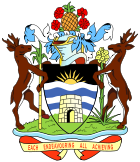
Back Seznam generálních guvernérů Antiguy a Barbudy Czech Antigua og Barbudas generalguvernør Danish Liste der Generalgouverneure von Antigua und Barbuda German Γενικός Κυβερνήτης των Αντίγκουα και Μπαρμπούντα Greek Ĝenerala guberniestro de Antigvo kaj Barbudo Esperanto Gobernador general de Antigua y Barbuda Spanish Antigua ja Barbuda kindralkuberneride loend Estonian Antigua ja Barbudan kenraalikuvernööri Finnish Gouverneur général d'Antigua-et-Barbuda French Gobernador Xeral de Antiga e Barbuda Galician
| Governor-General of Antigua and Barbuda | |
|---|---|
 Emblem | |
 | |
since 14 August 2014 | |
| Viceroy | |
| Style | His Excellency |
| Abbreviation | GG |
| Residence | Government House |
| Appointer | Monarch of Antigua and Barbuda on the advice of the prime minister |
| Term length | At His Majesty's pleasure |
| Precursor | Governor of Antigua |
| Formation | 1 November 1981 |
| First holder | Sir Wilfred Jacobs |
| Deputy | Deputy Governor-General |
| Salary | 108,630 XCD annually[1] |
| Website | https://gg.gov.ag/ |
 |
|---|
The governor-general of Antigua and Barbuda is the representative of the monarch of Antigua and Barbuda, currently Charles III. The governor-general is nominated by the prime minister, and appointed by the monarch. The governor-general exercises the powers of the monarch, and thus appoints ministers, senators, judges, and ambassadors; gives royal assent to legislation; and issues writs for election. The governor-general also exercises the powers of the commander-in-chief of the Antigua and Barbuda Defence Force.[2] The governor-general serves at His Majesty's pleasure, although in practice is usually removed following the election of a new party into power.[3]
In addition to his or her legal responsibilities, the governor-general also has many community and ceremonial duties including delivering the speech from the throne at the state opening of Parliament, accepting letters of credence from foreign ambassadors, distributing various honours and decorations, and representing the state at official events. In general, the governor-general observes the conventions of the Westminster system and responsible government, maintaining political neutrality, and has to always act only on the advice of the prime minister. The governor-general is supported by a staff headed by the official secretary to the governor-general.
The position was directly preceded by the governor of Antigua, established in 1632. The position has gone under many reforms and name changes throughout the years, primarily due to what is now Antigua and Barbuda being merged into various federations and colonies. The title of governor has at various times been renamed to lieutenant governor or administrator. At its territorial peak the governor of Antigua had jurisdiction over the British Leeward Islands.
The position of governor-general was established when Antigua and Barbuda gained independence on 1 November 1981. Since independence, four people have served as governor-general–all from Antigua, and three of them being men. Most governors-general have been either former politicians or distinguished experts in various academic fields. Due to the increasing desire of Antiguans and Barbudans to distance themselves from the colonial past, the governor-general has been viewed as a de facto head of state[4][5] culturally, and many have proposed that the position of governor-general replace the monarchy in the event that a republican system be adopted.
- ^ Laws of Antigua and Barbuda. "CHAPTER 195 - THE GOVERNOR AND GOVERNOR-GENERAL'S EMOLUMENTS AND PENSION ACT" (PDF). laws.gov.ag.
- ^ Worldwide Government Directory with Intergovernmental Organizations, SAGE Publications, 2013, p. 32, ISBN 9781452299372
- ^ Cite error: The named reference
:1was invoked but never defined (see the help page). - ^ "Governor-General". Commonwealth of Nations. Retrieved 26 January 2025.
- ^ "Antigua and Barbuda Government".
